#violence begets violence hence she had it coming
Explore tagged Tumblr posts
Text
Solaria’s chapter really had me looking like

JESUS. MY GOD WOMAN WHO HURT YOU 😭😭😭 BUDDY WAS NOT HOLDING BACK THAT SHIT WAS TERRIFYING AND SICKENING TO READ (the techniques 💔 I forgot they existed and I only ever read it online a year or two ago so like. it had be doubling over in shock like what what what??? time to remove my respiratory system what did i just read ??? jushtin come get your throne buddy .. you deserve need it more than she does..)
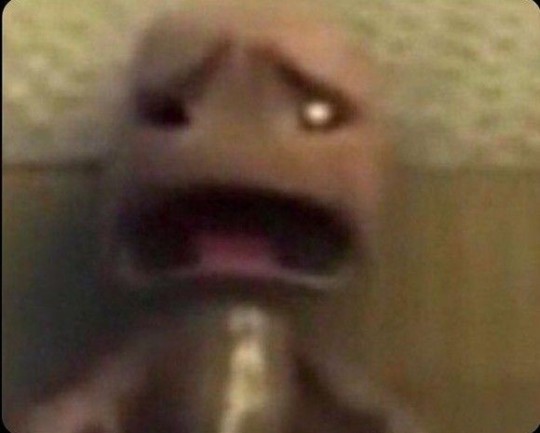
#solaria butterfly#solaria the monster carver#star vs the forces of evil#svtfoe#star vs las fuerzas del mal#i am SO CONFLICTED#shes one of my favs okay but my god that was horrifying i dont even know what to say#huh 😨😨😨😨#what was the reason???#“they’re happier this way” mf sounds like shes trying to convince herself rather than the reader like is you in denial 😭#sigh#i get asked a lot how i feel about her death so →#violence begets violence hence she had it coming#although my heart broke for eclipsa because ofc thats her mother and i do make content of them a lot BUT STILL#when you think about she had it coming#feel free to disagree ofc!! just my opinions and personal thoughts#ooay thats enough yapping#i need to go to bed#sighh#hi mutuals love you guys/p
14 notes
·
View notes
Text
SNK 137 Review
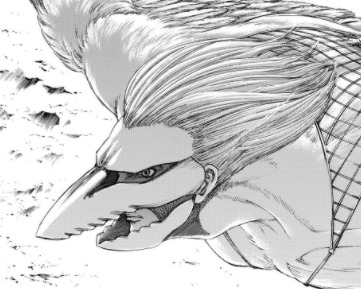
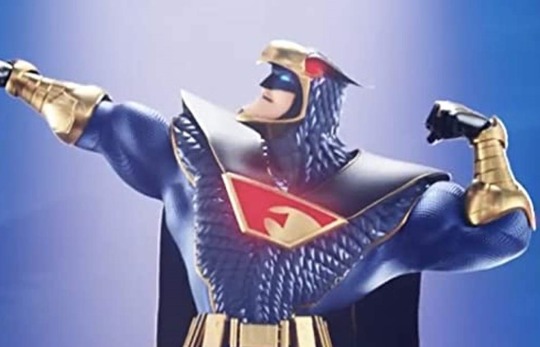
I can't unsee it.
-rubs temples-
Ok, I know I’ve been absent the past two chapters. I’ll get to why and what I thought of 135 and 136 in this post, but for now…jeez, this chapter.
It was badass and dumb and sometimes both at the same time.
Where do I even start?
-sound of pages being leafed through-
Ok, then.
I actually really like Zeke’s character. He is unironically my second favorite out of the cast.
When we first see Zeke, he’s in his beast titan form. He’s lumbering, hulking, unsettling.
He’s a titan that can talk. He’s a titan that can control other titans!
And he wiped out humanity’s second strongest with ease. I forget his name. It was Mickey, right?
Worst than that, actually. He ordered his titans to kill Mickey with all the gravitas of ordering a side of fries at McDonald’s.
Iirc fans were wondering if this new character would be the main villain of the series.
He went on to wipe out the Survey Corps at Shighanshina, and after that we learned he singlehandedly foiled his parent’s right-wing conspiracy when he was a kid.
Zeke was a mastermind who shouldn’t be taken lightly…right?
Welp, the more we saw of Zeke, the more obvious it became that he wasn’t actually all the impressive.
He wasn’t very good at being a warrior. Honestly, it seems most of his high marks comes from his unique royal blood powers, and the good will be built with Marley when he turned in his parents. TFW cronyism.
He foiled the restorationists plot, but really he was just an abused kid who wanted to get away from his parents.
He killed Mickey, but Zeke was a King Kong sized titan and Mickey was caught off guard and unarmed, so…yeah, ofc he won that fight.
Zeke has royal blood powers, but that doesn’t say anything about his intellectual prowess or anything.
The Survey Corps was wiped out at Shighanshina, but the circumstances of that fight strongly favored him. The Survey Corps were trapped in the city, so all Zeke had to do to win was sit on his ass and do nothing.
And he almost died anyway.
Levi got the drop on him because of his own incompetence. He let himself get distracted, which created the opening for Levi to strike.
Throw in his gullibleness towards Eren, his bumbling demeanor, and his totally emo philosophy, and the true nature of Zeke Jeager became undeniable: this guy is a fucking moron.
Like.
A real fucking moron.
And that’s why his character is unironically so great!
Zeke’s character is such a brilliant subversion of audience expectations.
We were all made to believe that this guy was a Big Fucking Deal through what turned out to mostly be circumstantial reasons.
In reality, he’s an idiot who’s been failing upwards his whole life.
Zeke got as far as he did because he’s really lucky. That’s all he has going for him.
I liked the more fleshed out version of his world view we got here. It is appropriately emo.
My read on Zeke has always been that if he existed in real life he’d be an extremely online philosophy bro, so seeing his outlook on life being effectively copy pasted from 4chan was just delightful.
Zeke is 2deep4(chan)u.
Life exists to multiply. All actions are explained by this singular drive. As such, life is hollow and we’re better off dead.
Imagine that is how you see the world.
Life sucks. It’s an existence of suffering driven by a desire to ensure more people are brought into this world so that they can toil away ensuring that yet more people are brought into this world to toil away ensuring people are brought into this world.
On and on and on and on.
To Zeke, this is the cycle of violence.
Not war which begets war which begets war, but rather life itself.
One suffering existence that begets another suffering existence that begets yet another suffering existence.
That is the context from which the euthanasia plan came from: it was an extension of this broader world view.
Everyone gets a dose of pain in this world, but Eldians especially get shafted. If anyone deserved release from this nihilistic existence that is “being alive,” it’s them.
Hence, Zeke’s plan to sterilize Eldians so they can die out peaceably.
…
It’s hilarious how easily Zeke is disabused of this notion.
I’m not sure if it works from a storytelling perspective, but it tracks perfectly with what usually happens when emo philosophy bros like Zeke have their beliefs challenged.
The emo bro will go on a self-absorbed rant about how nihilistic life is. For sake of example, let’s say the reason is because morality is just an opinion and nothing is objectively wrong.
The n the guy he’s ranting to will drop a critique on the bro so devastating that they’re left speechless:
“What about murder? Isn’t murder objectively wrong?”
Emo bro: -surprised pikachu face-
I swear to God this happens a lot. I don’t know if transplanting that into this pivotal storytelling moment works, but I sure as hell enjoyed it.
But, yeah, while we’re talking about philosophies, let’s look at some others.
Armin thinks there is beauty in pointless moments. Moments that are meaningful only for the people who partake in them. They’re an expression of the love they have for each other. Those moments are worth cherishing and protecting.
He’s right, but you know who also thinks that way?
Eren does.
Superficially, anyway.
When Eren starts rumbling the world, he thinks of his friends and the fun they’ve had together. He’s doing it for them.
Of course, he’s hurt them instead, but that’s still his logic, however deranged it may be.
What separates Armin from Eren is their sense of boundaries.
There are places that Eren is willing to push on towards that Armin is not.
For that, Eren thinks Armin is weak. All Eren had to say to him when they spoke at the restaurant was how useless Armin was.
Armin can’t go the distance. He can’t do what’s necessary. He takes options off the table too easily. He wanted to negotiate instead of seeing the truth that war was inevitable.
To Eren, that’s weakness.
In reality, it’s empathy.
Armin cares about people. Even people who hate him.
Eren doesn’t. If you’re his enemy, you’re dead to him, period.
Eren has no soul.
He may have slept under his enemy’s roof, ate his enemy’s food, and saw the good in them for himself, but he’s still killing them.
I don’t care if he’s crying on the inside. I don’t care how many times he said he’s sorry to Ramzi.
That actually makes it worse.
Eren made the calculation, the conscientious decision, that the lives of billions of people across multiple civilizations were worth less than that of his race.
Not even his whole race; just the subset of his race he was most familiar with!
Eren and Armin represent two widely similar, yet subtly different philosophies.
For Eren, the world is beautiful, but you have to do cruel things to protect that beauty.
The world is cruel because it is beautiful.
For Armin, the world is beautiful, but it is plagued by cruelty.
The world is cruel, but also beautiful.
SNK made the right choice. Armin was rightly depicted as the superior worldview.
(I have some gripes about how endemic the series seems to think cruelty is to the world, but we’re ignoring that now.)
Ymir is more of a wild card than I thought she’d be.
It seemed straightforward.
Ymir had been beaten and enslaved her whole life, so when Eren offered her freedom and treated her life a human, she sided with him.
That still looks to be what happened, but it seemed like Ymir also genuinely wanted to destroy the world with Eren.
The world treated her with cruelty, so of course she’d want to burn it all. Makes sense, right?
But Ymir, it turns out, is a lot more complicated than that.
She was beaten, enslaved, raped, hunted like an animal, and after all that, she still believed in this world.
She saw two lovers together, and that embodied what made the world worth getting attached to.
Those two lovers were her conquerors. Her oppressors.
She saw the love between two of her slavers, and instead of resentment or jealousy, she simply knew it was beautiful.
If people threaten his freedom, Eren wishes death upon them.
When Ymir is literally enslaved by them, she still acknowledges the beauty of their romance.
It’s a cool layer of complexity to add to their dynamic. They’ve been through similar shit, but they couldn’t be more dissimilar.
My guess is that Ymir is sympathetic to Armin and everyone came back to life through her help.
I know Armin Zeke the credit for that, but…that makes no sense?
Eren defeated Zeke when Ymir sided with him and he started the rumbling.
Eren, via Ymir, is in control, not Zeke, so it makes no sense for Zeke to be able to do any of this.
The only explanation is that Ymir broke from Eren and now Zeke is her new best friend.
…Yeah, this is the part where I talk about the bad stuff with this chapter.
The exact mechanics of how all of this went down is very underexplained.
Zeke being able to reveal himself like he did can be chalked up to Ymir’s power, but if it’s true this was purely Zeke’s doing, then…how?
How was Zee able to do that if Eren is in control? Why would Eren even put Zeke there instead of encasing him in crystal and keeping him physically close by?
This whole final battle has been very underwhelming for me, which is why I didn’t do a review for the last two chapters.
The premise is pretty bland.
The Alliance’s main opposition in this fight are mindless drones. The titans they’re fighting have no humans inside them, they’re just puppets. NPCs.
What drama there has been here has been the same fucking crap we’ve been dealing with for the past few volumes.
Yes, Mikasa, Eren has to die.
I know this is hard for her, but my patience has run out.
Eren told her to her face that they had to kill him if they wanted to win, and then when the Alliance is riding on Falco’s back, they make the final call to kill Eren and this is the face Mikasa makes.
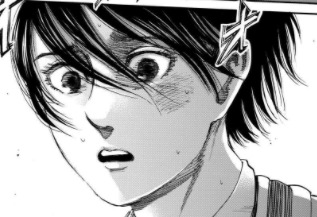
Like this is the first time she’s heard it.
This is the face you’d expect from a child, not a grown ass adult.
That was the moment I became convinced Mikasa would probably die in this fight.
Her head is too far up her ass as this point.
She is utterly incapable of processing the obvious fact that Eren hates her.
Yes, he’s theoretically destroying the world partly for her, but he’s also deranged and too self-absorbed to see that he’s hurt her. He has no real regard for her.
It is beyond annoying that there has been almost zero progression for her character on this issue.
If by this point in the story, she had accepted that Eren had to die, but was still visibly coping with that, then all would be well.
What’s frustrating is that just when it seems like we’ve progressed past that stage, we learn we haven’t.
I also feel that a lot of the major beats of the fight were pointless.
A major point in the battle comes when Armin gets eaten by the Okapi titan, and Mikasa, Annie, and the rest have to rescue him. But Armin didn’t seem to be in any danger of dying, and him being sent to P A T H S was actually a good thing in the end because he was able to win over Zeke.
The whole deal with the explosives around Eren’s neck was also pretty badly handled.
You’d think the hard part would be getting the explosives to the neck and securing them to it, but nope. Pieck took care of that in a couple of panels, and the real meat of the fight is doing the very last thing they need to do to win.
It’s very tedious and contrived.
Instead of a fight that’s interesting because they have to wrestle their way through titans while carrying the bombs, we get a totally generic fight because the story breezed through the hard part and all they have to do now is push a single button to win.
But in the end that entire sequence was pointless because Armin decides to blow everything up anyway.
Jean’s shining moment?
A total waste.
Reiner’s shining moment...wrangling that worm thing?
Also a total waste.
Armin was going to blow it up anyway. There is no way you can say that Eren would have survived Armin’s explosion but for Reiner and Jean’s efforts.
It just defies all common sense.
So yeah, this whole battle was a pretty lackluster climax.
Looking to the future, I think this is it.
There’s only two chapters left, so we need to start wrapping up. My guess is Eren’s likely dead and next chapter starts the epilogue.
Tally-ho.
---
I made a post about all the character’s chances of living or dying by the end of the manga. I figured I’d update those death ratings here.
Eren: Likely Alive --> Lean Dead
Historia: Likely Dead --> Toss Up
Mikasa and Reiner: Lean Dead --> Lean Alive
Annie: Lean Alive --> Likely Alive
Jean and Connie: Likely Dead --> Lean Alive
Pieck: Toss Up --> Lean Alive
Zeke: Lean Alive --> Ded
You’ll notice I’m still rating most of the cast as having a significant chance of dying.
While I do feel that this is probably the end of the battle, I’m choosing to be cautious in my choice of ratings.
Mayhaps Eren will pull a come from behind victory.
Ya never know.
21 notes
·
View notes
Text
The Light Bulb Moment: Arrow 7x05 Review (The Demon)
Oliver Queen has a light bulb moment that’s been seven years in the making.

Team Felicity (yes that’s the name) has one as well, which means we are that much closer to being done with the prison arc!

Let’s dig in...
Oliver Queen
We finally find out who The Demon is and I gotta say I was legitimately surprised. However, as soon as I found out it was Talia Al Ghul I thought

It had to be someone related to the League of Assassins and Talia would consider herself The Demon since Ra’s Al Ghul is dead. It’s not like Talia and Nyssa are besties. The amount of hoops Oliver had to jump through to get to The Demon also fits perfectly with Talia Al Ghul, as he notes.

The real question is how Talia ended up in Slabside and it seems we have Batwoman to thank. Nice shout out to Gotham and a not so subtle reference to the rapidly approaching crossover.
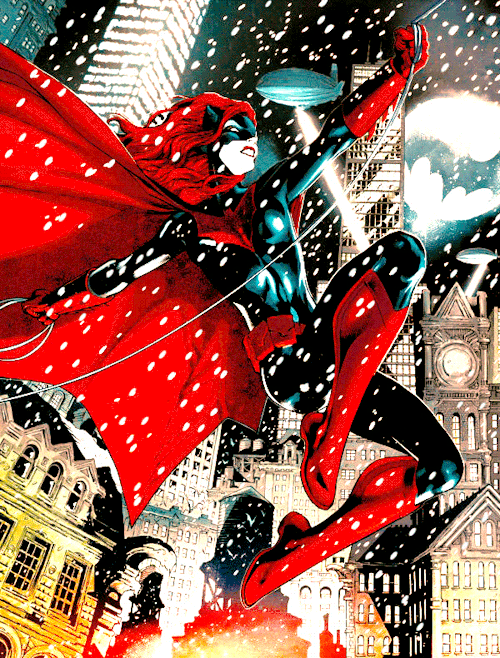
Talia survived Lian Yu, but it was Diaz’s super drug that healed her. Not unlike how it temporarily healed Diggle’s injury. Excellent tie in writers.

Talia is beholden to Diaz, but unfortunately she has no idea where he is. UGH.

It’s a little surprising Talia believes Oliver will help her escape. Listen girlfriend, you sided with Adrian Chase and his baby Mama ended up dead.
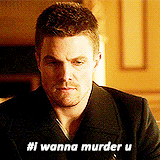
However, Talia (rightly) points out Oliver murdered her father. She’s not exactly an Oliver Queen fan. So, whatever Dr. Parker is doing to the prisoners is making Talia pretty desperate.
Oliver: You stood on the same side as Adrian Chase and my son lost his mother. So now I’m here trying to save what’s left of my family because I am stuck in a cycle of violence and I have been stuck there since the moment you told what to do with my father’s list.
(Not gonna lie, I was a little verklempt when Oliver referred to Samantha as his family. Olicity and Samantha would have killed it at co-parenting.)
It seems like Oliver has bought into Dr. Parker’s brain bullshit, but he’s just playing along. He doesn’t really believe he’s been stuck in a cycle of violence. I mean, he has but not in a bad way or at least not entirely. I also argue with his conclusion the cycle began when he met Talia. Oliver was thrown into violence the second he stepped onto the raft.
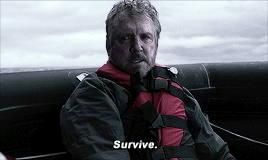
Talia didn’t create “the monster.” She just gave Oliver direction on how to use it.

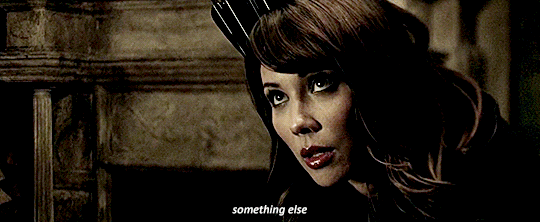

There are a couple reasons why Oliver is pretending to be brain washed. It is possible he believes he’s being watched and doesn’t want to tip off Dr. Parker. Also, he met “The Demon” and she can’t help him with jack, so I don’t think he’s highly motivated to blow his cover for Talia. Finally, Oliver isn’t convinced Dr. Parker is doing anything horrible yet. He’s not buying what Dr. Parker is selling, but Oliver still believes he is trying to reform prisoners. What’s wrong with that?
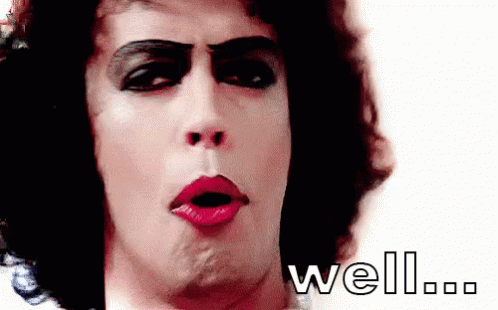
A lot if you try to kill them. When Oliver sees the dead body of the inmate who attempted to murder him in the shower fight, things start to look more alarming on Level 2. Talia is surprised Oliver cares about a man who tried to kill him, but he argues whatever is happening behind the creepy and nondescript door isn’t right. Talia is the one who told Oliver to help others and fight for justice, which is all he’s trying to do now.
This is an extremely important development for Oliver. Helping criminals has never been the Green Arrow’s modus operandi. Since Green Arrow is the warmer and fuzzier version of The Hood and The Arrow, you can trust neither of those identities were invested in helping criminals either. In fact, the Green Arrow put most of the criminals in Slabside. Oliver never thought much about why someone became a criminal and he never thought of them again after they were locked up. Of course, the locked up criminals are the lucky ones. There are many who never made it to jail. They went straight to a graveyard.
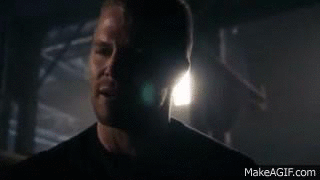
Oliver’s policy on killing is fluid, ever evolving and occasionally flip flopping, much to my frustration most of the time. Let’s review:
Season 1: Killing
Season 2: Not killing (except for The Count)
Season 3: Not killing (except for attempting to kill Ra’s Al Ghul on the mountain because Felicity said it was okay and ultimately killing Ra’s Al Ghul in the season finale)
Season 4: Not killing (except for Damien Darhk because he killed Laurel)
Season 5: Killing (except for Adrian Chase because that would’ve proved his point)
Season 6: Not killing (he never caught Diaz so the jury is still out on how Oliver plans to deal with him, but I am thinking jail)
Looking at this it’s fair to say Oliver doesn’t have a hard and fast rule when it comes to killing. He operated from a kill or be killed perspective in Season 1 and Season 5.
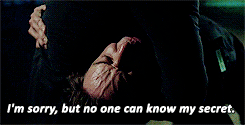
His “no killing” rule was set aside anytime the Big Bad was perceived as a large enough threat or for retribution in Season 3 and Season 4.
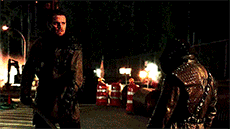
The whole point of having a moral code is to stick to it. If Oliver is prepared to deep six his code whenever it’s inconvenient or difficult to hold to then it’s not really a code. Hence, the reason I’ve been coming down on him so hard about this for the last seven years.

I believe all human life has value and therefore we cannot kill another human being. Of course, war or acting in self defense is a different story, but my overall stance on killing is a big, fat NO. However, I’m not losing any sleep over any of the people Oliver Queen has killed. These villains are awful, they did horrific things, and deserved to get got. We can even make the argument the world is a better place without these people in it.
However, simply because someone deserves to die doesn’t mean he/she should. Oliver doesn’t get to be judge, jury, and executioner simply because he wears a mask. He may catch criminals outside of the law, but Oliver is not above the law. His killing is a strong argument against vigilantism and Oliver has been striving to be a better hero for several years now.

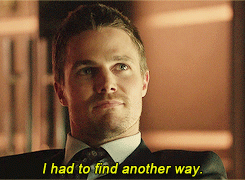
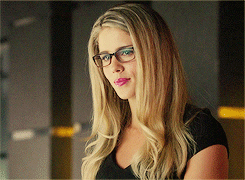
This isn’t entirely Oliver’s fault. For some reason, the writers are determined to box him into an either or choice. Either the criminal goes free or you kill him. I’ve been screaming, “WHAT ABOUT JAIL?” for the last seven years because guess what? We have a way of keeping society safe without killing the criminal.
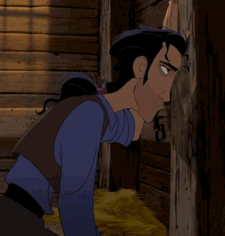
Is it a perfect system? Of course not, but no system is. Not allowing Oliver to avail himself of this option while Barry Allen gets to have his very own meta prison seems a little unfair.
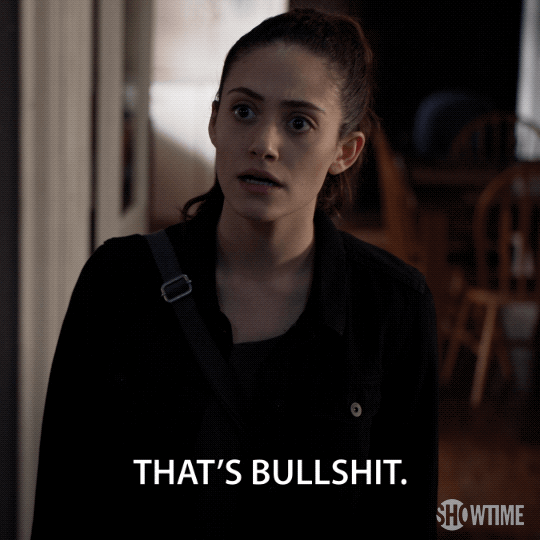
Yes, men like Ra’s Al Ghul and even Damien Darhk may too much to handle even for Slabside, but Oliver had his very own A.R.G.U.S. prison on Lian Yu that he never used, except for Slade Wilson and the Boomerang guy.

Why? Because that’s Arrow and sometimes Arrow is dumb. They want to Oliver constantly deciding whether the villain lives or dies because it’s one way they mark his superhero evolution.
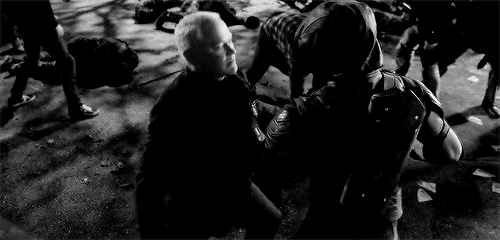
I was particularly hard on Oliver regarding Damien Darhk. Not because I believed Darhk deserves to live – he nuked an entire city. However, Oliver killed Darhk because he killed Laurel. Damien was unarmed and de-magicked. Oliver easily could have handed him over to the authorities. Instead, he drove an arrow through him on live television. Thus, creating many of the legal problems Oliver faced in Season 6 and Season 7.
And that’s the point. Killing doesn’t erase consequences. It creates them. Yes, maybe the villain escapes prison and more lives are lost. Maybe the justice system won’t work. Although are we really worried the legal system won’t punish perpetrators of mass genocide? No. Probably not.

Killing Ra’s Al Ghul ignited a rage in Talia. She sided with Adrian and played a role in Samantha’s death. If you want to know how Damien Darhk’s daughter turns out flip on Legends. It ain’t pretty.
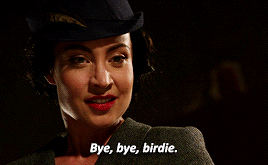
Retribution begets retribution. This is the lesson Adrian Chase taught Oliver and so he began to view killing a different way in Season 6.
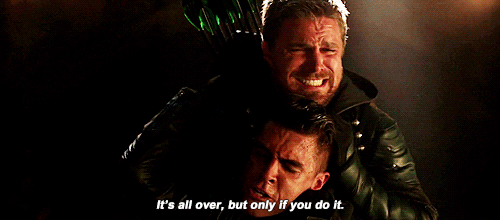

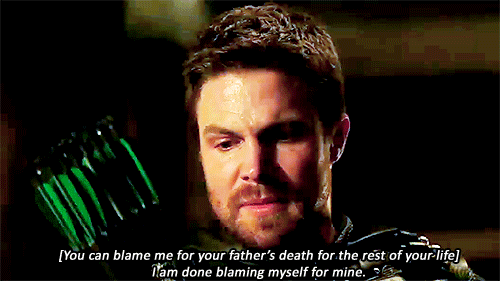
It’s why Oliver tried to catch Diaz and not kill him.
Oliver: These people are being treated like they are disposable. No one deserves that.
Oliver’s always evolving morality is taking a very important step. He is feeling empathy for the very murderers he helped locked away. Oliver believes these people deserve basic decency despite the horrible crimes they committed. He is beginning to see the criminals’ humanity.
Why is this important? Oliver’s “destiny” is to become the Green Arrow – a fully evolved superhero. Superheroes typically don’t kill. These characters, for the lack of a better word, are Christ like figures. Superheroes have integrity, determination, love, compassion, honesty and honor beyond the regular, everyday person. They are capable of things most people could never dream of doing. It’s why they inspire us. They challenge us to be better because they are better. It’s what makes them superheroes.
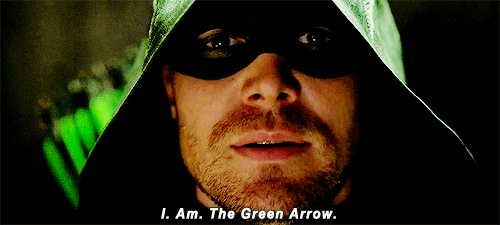
This is where Oliver is headed. His morality has to be beyond reproach. Superheroes don’t lie, cheat or kill. Oliver has worked very hard at fixing these problem areas in his life for the last ten years. Is he perfect? No, not even a superhero is perfect. He/She is pretty close though, which is hopefully where Oliver’s origin story ends.

Maybe you or I can’t feel empathy for a criminal, but Oliver Queen is called to be better than us. He will draw the line in the sand, so it’s important he doesn’t cross it. The Green Arrow will be the example Star City will look to, so his moral code better be unbreakable.
This means NO KILLING. Not even when the villain deserves it. Not even when Oliver has the moral high ground. Not even when Oliver deserves revenge. Not even when it may protect the city.
There will always be unforeseen consequences to killing, but the real reason Oliver shouldn’t kill is because every life has value. Oliver can understand and even empathize with some of these people now that he is considered a “criminal” too and has spent so much time with them. It will be very difficult for Oliver to kill a villain when he can see their humanity. It doesn’t mean they deserve freedom, but they don’t automatically deserve death either. There’s a middle ground here. If Arrow will finally allow the Green Arrow to avail himself of the prison system, then he can be a better example to the city.
Talia isn’t impressed with Oliver’s new found empathy for criminals, because he did not show it to her father when it mattered. Yeah, well your father tried to poison an entire city cutie, but that’s just details.
Oliver: No because I back then I still allowed the monster that you unleashed to take over.
This is how we know Oliver is faking with Dr. Parker. You can call it whatever you want – Oliver’s monster, darkness, demons, etc. The name doesn’t matter. Oliver has evolved beyond it. The rage he feels no longer controls him. He faced his “monster” in Season 5 and learned to control it in Season 6. He’s already dealt with all of these issues.
Oliver: Ra’s death was my fault. I couldn’t see past what he intended to do to my city, so I didn’t stop and think about his family, and for that, I am truly sorry.
I could argue Oliver deserves prison. Technically, he is a murderer and not all of his “kills” were done in self defense.

He acknowledges there was another way with Ra’s Al Ghul, but he didn’t take it. Talia is one of those unforeseen consequences to that decision and Oliver is truly sorry for the pain he caused her.
If you believe Oliver deserves redemption for some of those calls then apologizing to who he hurt is an important part of the process. It’s no different than Bl*ck S*ren. Is an apology enough? No, but Oliver has also spent six months locked away from his wife and child. He’s been beaten, tortured, psychologically lobotomized, and almost killed. (Also, I raise my “Ra’s Al Ghul committed mass genocide” flag again.) We’re not dealing with apples to apples here, but in the cosmic scale I think Oliver Queen comes out just fine.
Oliver and Talia fight their way into “the room” to take on Dr. Parker.

Source: @olivergifs
We get some extremely excellent fight scenes.I am so happy we are back to the days of Oliver taking down 50 bad guys by himself or with someone who actually knows how to fight.
Now it’s Oliver’s turn to drop some truths on Dr. Parker.
Oliver: My father pushed people away. He kept secrets, and I made those same mistakes. But if I choose to break the cycle, I’m gonna do it my way.

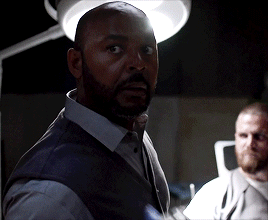

Source: olivergifs
MY SON IS SO GROWN!!!!!!
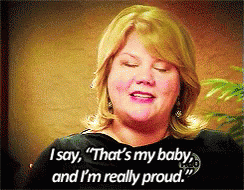
Oliver yelling his name in his growly voice will always be awesome. I am thrilled any time Oliver can achieve insights into himself and his father. It’s not the cycle of violence he needs to break. If he’s going to be the Green Arrow and Oliver Queen (and yes that’s where this is headed) then there’s going to be some violence. Oliver can tweak how much violence he’s going to engage in though.

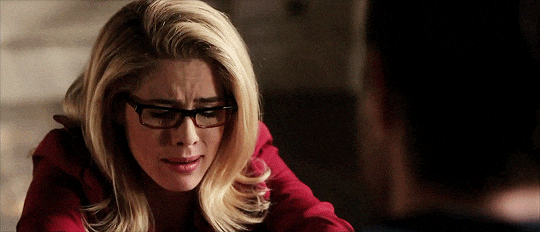
What’s really important is breaking the cycle of lies and walls. Oliver cuts himself off from those he loves just like Robert Queen did. He has grown so much over the past seven years, and his sacrifice was so selfless, but he still lied to Felicity about prison. He made the decision without her. Every time Oliver lies and pushes people away he hurts those he loves and himself.
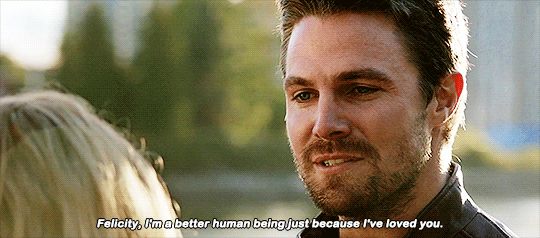

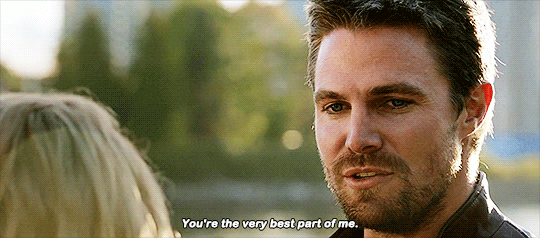
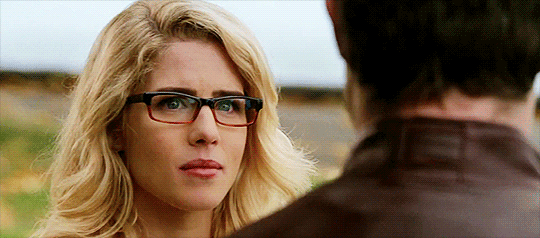
The monster no longer has power in Oliver’s life because he’s embraced love. Every time he chooses an unrighteous path it’s an opportunity for the monster to regain control. Every step away from the light is a step towards darkness. Being a good man is not limited to wearing a mask. He must be a good man as Oliver Queen and as the Green Arrow.
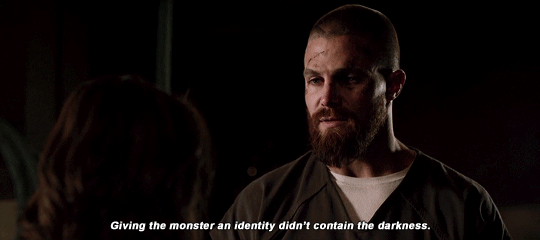

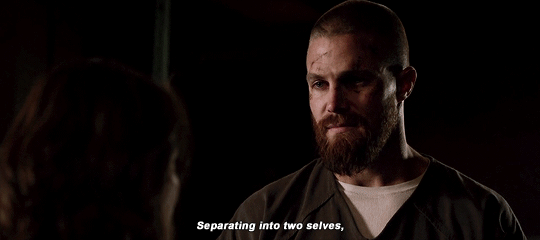
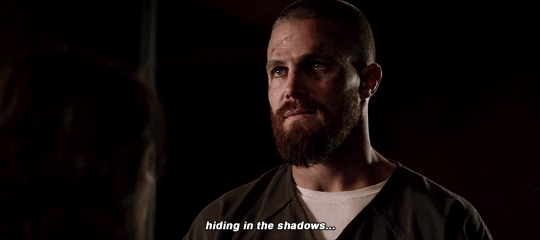

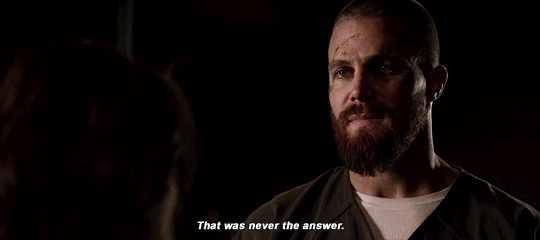
Source: @olivergifs
SEVEN YEARS Y’ALL!!!!!!!!!!! I HAVE WAITED FOR OLIVER QUEEN TO COME TO THIS CONCLUSION FOR SEVEN YEARS!!!!!!!!!
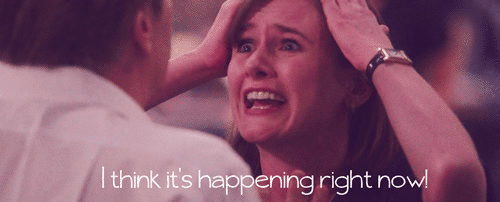
Season after season, review after review, waiting, watching and hoping for him to finally understand man and mask must be one. I am legit screaming. SCREAMING.
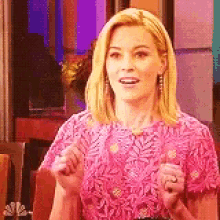
This was the light bulb I’ve been waiting to go off in his head. THIS MOMENT WAS EARNED! And worth the wait.
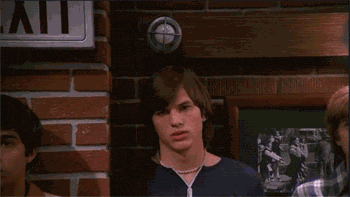
Oliver gives Talia the USB with the evidence they gathered to give to Felicity. He refuses to leave the prison because then he’d be a fugitive for the rest of his life. #OliverQueenPuttingHisFamilyFirstAlways.
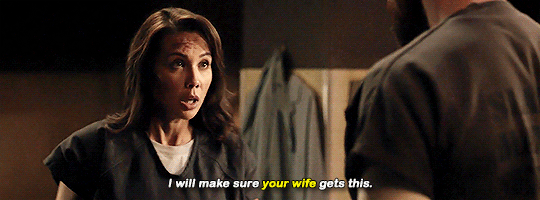
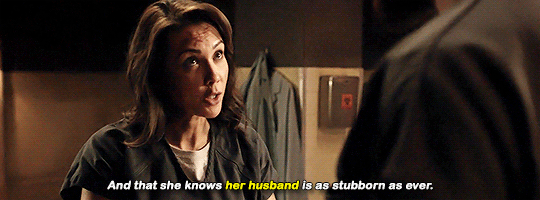
Source: smoakmonster
Trust me, Talia. She knows.

Oliver returns to Level One and is reunited with his prison wife Stan, who quickly informs him his real wife came for a visit.

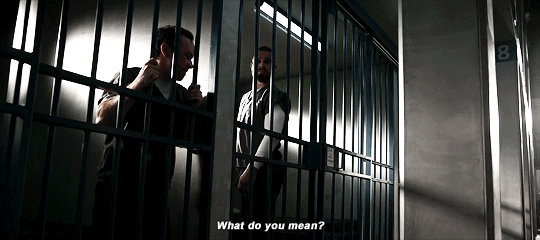
Every time Oliver hears Felicity’s name I swear to God his heart stops.
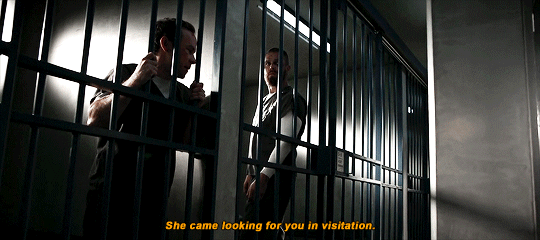

My heart broke for Oliver when he realizes he missed a precious visit with Felicity. He must have noticed she hasn’t visited as often as she could. (More on that in a minute).
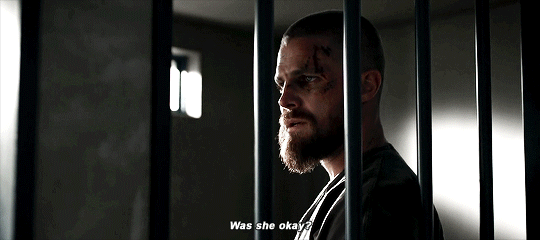
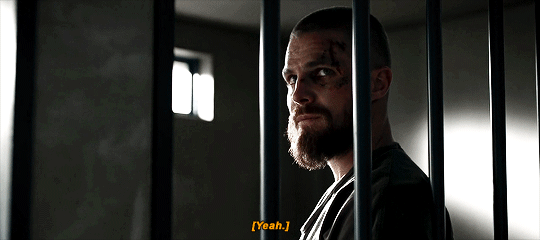
Source: oliverfelicitygifs
Stan tells Oliver that Felicity has a beat on Diaz and he’s not exactly thrilled. Oliver absolutely did not want Felicity going after Diaz and it’s clear he’s scared to death she’ll be hurt. He has no way of protecting or stopping her, which is exactly the point. Oliver doesn’t get to decide this time. He has to simply wait and see. Whatever is going to happen will happen. It’ll be interesting when these two are reunited because there are issues.
Oliver has retained his light inside of Slabside, he’s developed more empathy towards the people he’s fighting against, and he understands he can no longer separate his two identities. If Oliver is in need of redemption (particularly with Felicity) then I say he’s learned the necessary lessons to achieve it. It may be difficult for a time, but Oliver and Felicity will work through their problems once they are together again. In no small part because Oliver Queen is ready to be the man Felicity Smoak deserves and the hero Star City needs.

Source: smoakmonster
Felicity Smoak
I am falling in love with Felicity Smoak and Bl*ck S*ren. Nobody is more shocked than me. I don’t know what to tell ya.
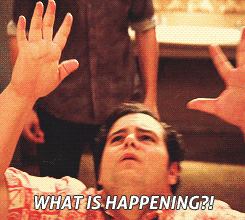
They make the perfect odd couple. Felicity is sunshine and roses while Bl*ck S*ren is a snarky (reformed?) murderer. There are some similarities to Oliver and Felicity or Laurel and Tommy, which is probably one of the reasons I am enjoying it so much. Light meets dark. Funny meets serious.
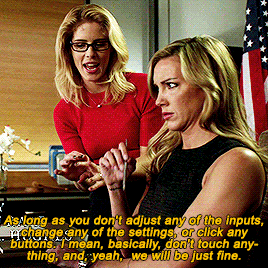
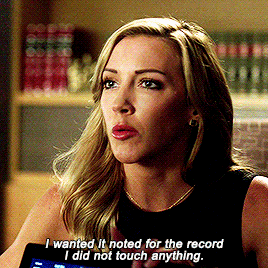
Source: hollandrooden
The sass and banter is funny and honest. Neither is worried about hurting the other’s feelings because they aren’t really friends. It allows the characters to say things to each other Felicity and our L*urel would never say. It also makes the development of whatever potential friendship they may have in the future feel natural.

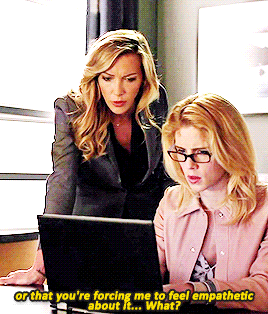
Source: dinah-lance
Whereas with L*urel, I feel her friendship with Felicity was rushed and didn’t develop organically. We went from L*urel glowering and not speaking to Felicity to immediately “favor friends” inside of a single episode.
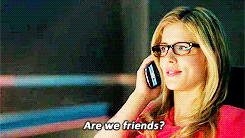

HUH?
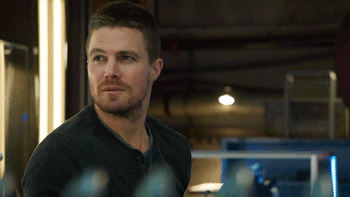
It was also a little weird how they never talked about the Oliver shaped elephant in the room too, but whatever that’s all past. None of this is a problem with Bl*ck S*ren and F*licity. In fact, all the things I asked for with L*urel L*nce I am actually getting with Bl*ck S*ren.
The writers are giving Bl*ck S*ren screen time to develop at a semi reasonable pace, the lawyer thing notwithstanding.
The other characters aren’t pretending she’s a saint or glazing over her mistakes. Bl*ck S*ren is being held responsible for the things she’s done wrong.
Felicity (and Oliver) have no problem taking shots at Bl*ck S*ren occasionally, because they don’t trust her and she deserves them.
Bl*ck S*ren fires back (hilariously I might add) and is rapidly becoming the Spike to Team Arrow’s Scooby Gang - something I think the show needs.
Bl*ck S*ren is lawyering more than Laurel ever lawyered even though she’s not a laywer, which is hilariously amazing in an off kilter sort of way.
Most importantly, she’s helping Felicity in a way that’s actually helpful!
If Bl*ck S*ren helps get Oliver out of prison and then my faves have all the sex, Imma gonna bake her cake or something. Anyone assisting Felicity this season gets an A+ and a gold star from me and Bl*ck S*ren is at the top of that list.

Listen, nobody is as shocked as me since I was loudly advocating for BS to remain evil. I still like her evil and will be fine if she regresses. However, if they are going to have a L*urel type character on this show then I want the writers to use her effectively. Thus far, they are with Bl*ck S*ren. It may all go to hell in a hand basket shortly, but for now leave me to my joy.
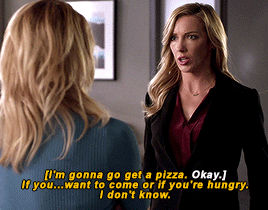

Source: felicitysmoakgifs
The best scene was BS asking Felicity out on a friend date. It was almost as cute as Oliver asking Felicity out. It was really sweet to see the part of BS that craves human connection reaching out to Felicity in such an adorably awkward way.
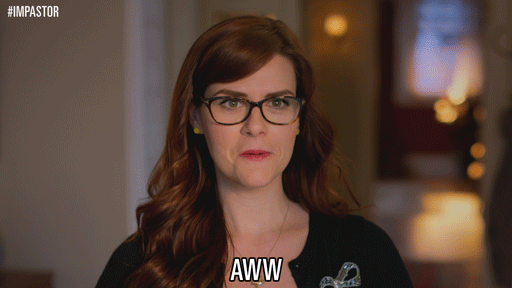
Alright, that’s enough about Bl*ck S*ren. Time to talk about our girl. Did anyone notice Felicity seems reluctant to visit Oliver?
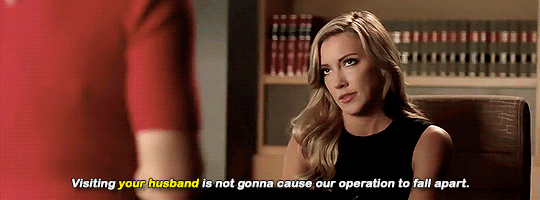
Source: smoakmonster
Bl*ck S*ren tells Felicity to visit her husband and essentially kicks her out of the office. Welcome the Olicity ship BS! The bar is in the back.

Her reluctance is very telling. Felicity is feeling bad about her last visit with Oliver. Girl, why? You’re fine. The man has lessons to learn.
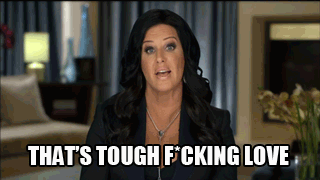
Unfortunately, Felicity is denied access to Oliver when she arrives. Felicity demands to see Oliver and think she uses “wife” and “husband” about twenty times in a sentence. Remember when we held our breath for one “wife” or “husband” last season? Now they use it with reckless abandon. It’s fabulous.
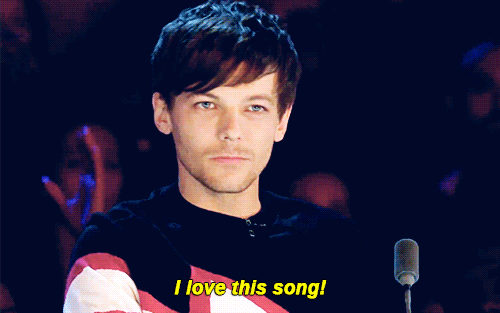
I have been dying for Felicity to meet Stan and yet I had no idea how Arrow would logically put these two characters together. I know logic isn’t always Arrow’s thing, but it’s not like Felicity can run into Stan and Oliver having dinner together. Turns out, this is not that hard!

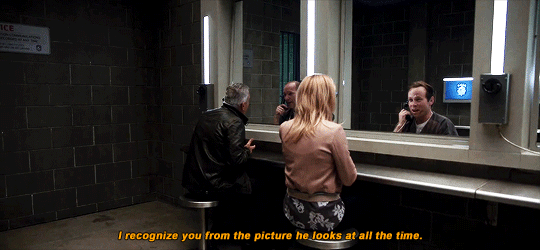

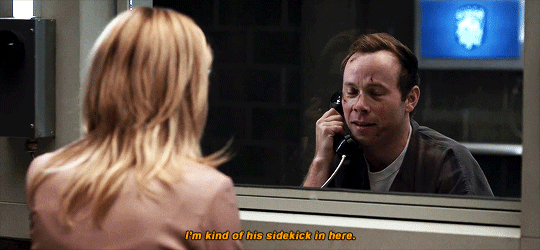
Stan lets Felicity know Oliver has been moved to Level 2. I will always be eternally grateful to Stan for telling Felicity the photograph has become Oliver’s binky.

I guess I was a little surprised at Felicity’s shock over Oliver stabbing a guard. She’s very “He would never!” about it whereas I am more “Sounds right. He broke a dude’s neck once.” Yes, that was during Oliver’s pre-Felicity days, but he’d burn down Slabside if it means protecting her and William. Her whole “Oliver is a choir boy” reaction rang false to me because Oliver is not a choir boy.
The first person Felicity runs to for help is BL*CK S*REN. We are living in the Upside Down.
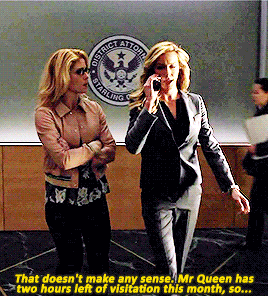
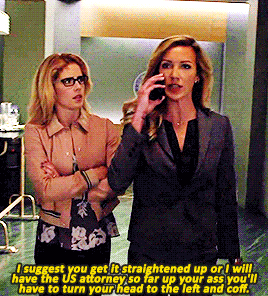
Source: dinah-lance
How much did you love Bl*ck S*ren yelling and threatening so Oliver and Felicity can visit each other? C’mere girl. Sit next to me. I made you a margarita.

Felicity confirms she’s only been there ONCE, and granted she was in witness protection for most of Oliver’s incarceration, but yeesh. It has to sting a little for Oliver that she hasn’t been back since. Don’t lie and make unilateral decisions next time, big fella.

Felicity would visit in sexy lingerie and bring store bought baked goods if you just LOOP HER IN.
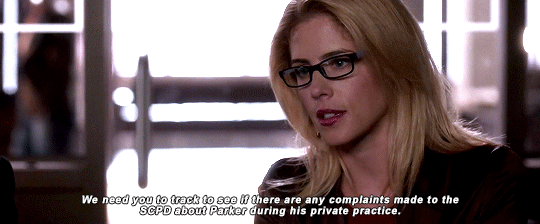
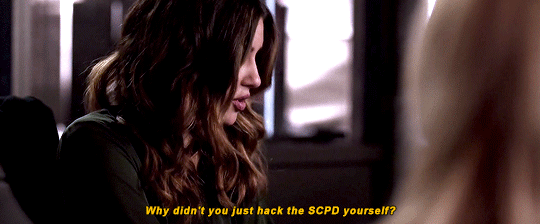
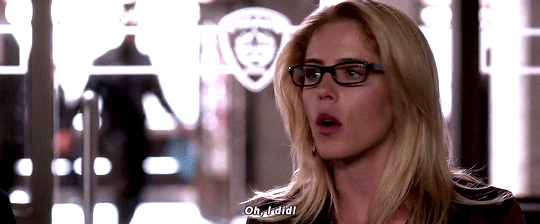

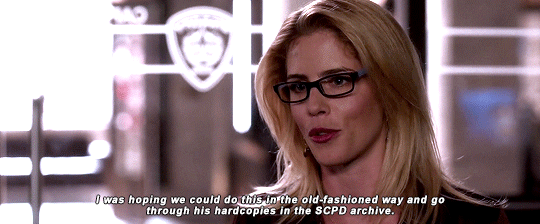
Source: felicitysmoakgifs
Bl*ck S*ren and Felicity go to Dinah to get information on Slabside’s Level 2, since there are no digital records.
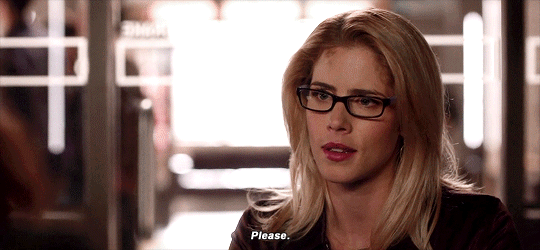


Source: oliverfelicitygifs
Dinah hems and haws about helping Felicity, and she pretty much has to beg, which ticks me off to no end. You are part of the reason Oliver is in prison, Dinah. MOVE YOUR ASS. If Felicity wants to access to the evidence room you should be making her a copy of the key so she can come and go as she pleases. #NewbiesStopPissingMeOff2018

The records are a mess.
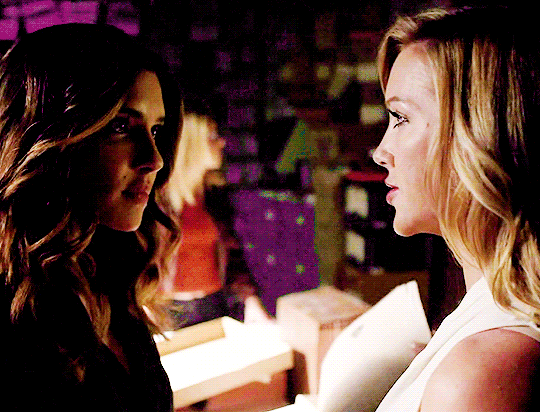
Source: dinah-lance
Dinah and BS spend a lot of time arguing about which legal method is best to help Felicity, but to be frank both their ideas suck and take too much time. Felicity kind of loses it.
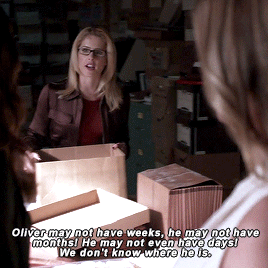
Source: oliverxfelicity
She’s feeling an immense amount of guilt for being angry with Oliver over his decision to go to prison and not visiting. In typical Felicity fashion, she blames herself for whatever Oliver is going through. She believes she could have prevented it.

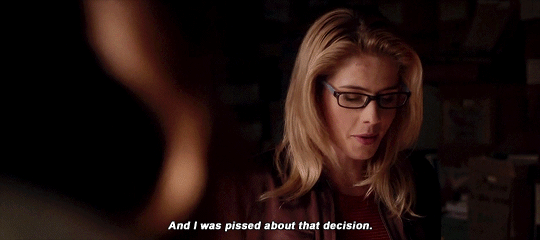


Source: oliverfelicitygifs
Felicity Smoak breaks my heart. Listen sweetie, Oliver is a big, dumb oak tree A LOT. It’s okay to get mad at him sometimes. This man is a full time project. He’s exhausting.
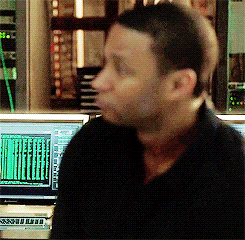
If anyone is concerned about Felicity and Oliver’s marriage then this speech should tell you everything you need to know. Being mad at your partner does not automatically mean you don’t want to be with your partner. Marriage doesn’t work like that. For better or for worse is legit. You can be so angry with your spouse you want to throttle them and yet still love them more than anything else on this earth.
Felicity can be mad at Oliver and still be madly in love with him. What Oliver did is no little thing. He made a massive and unilateral decision for their entire family without consulting Felicity. She has to live with the consequences, but had no say in her own life.
We’ve seen time and again when Felicity is angry with Oliver she needs time and space to process those emotions. Felicity needs to work through her feelings before she can work through the problem with Oliver. It doesn’t mean she wants to end their relationship.
While she’s been looking for Diaz and processing her anger, Oliver has been going to extremes in his battle to track Diaz too. Unfortunately, now he’s missing.

This all hits Felicity where it hurts because her worst fear is losing Oliver. She thought losing her husband was bad enough, but now Felicity is scared Dr. Power’s mind warp program will take Oliver from her forever.
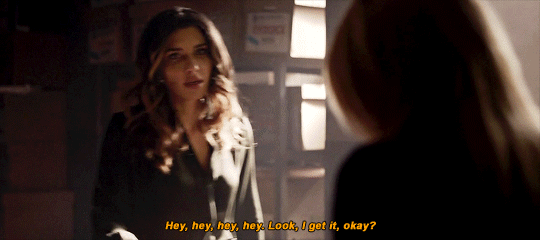
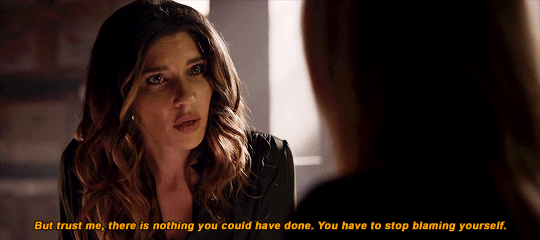
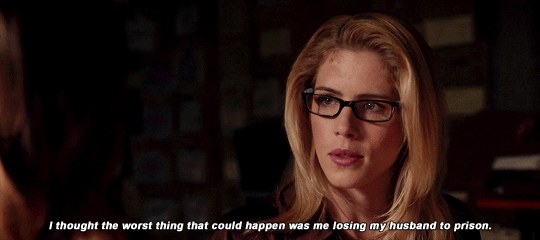
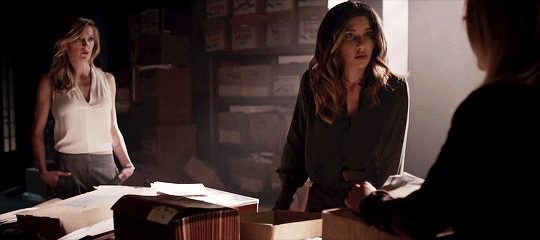
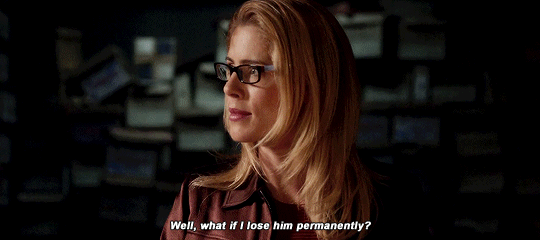
Source: oliverfelicitygifs
I just want to hug Felicity and tell her she doesn’t have to worry about Oliver’s mind being erased.
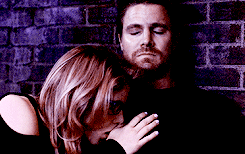
He dealt with all his deep and dark issues in the sewer with her. Felicity loved him through it and that’s the reason Oliver has remained intact on this new island. UGH. MY BABES.
Oliver and Felicity have remained connected despite their physical separation, but the distance is having an impact on them. They are starting to feel the consequences of time, distance, hurt feelings, and lack of communication. ENOUGH ALREADY! LET THEM BE TOGETHER! I WANT IT TO STOOOOOP!
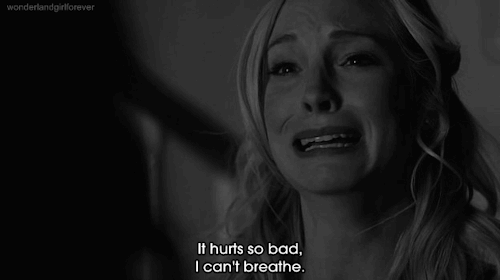
Long story short, Felicity discovers Dr. Powers is going to erase Oliver’s mind and finds evidence connecting him to a cold case murder. That, along with Oliver’s evidence, is enough to get the Level 2 program shut down. It makes me a little sad Felicity doesn’t know the evidence is from Oliver. TALIA YOU HAD ONE JOB.
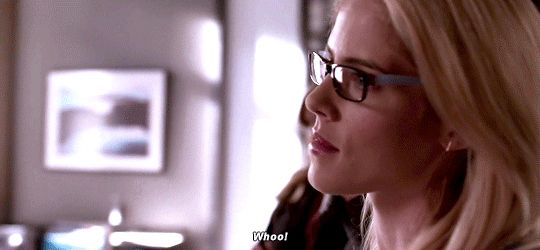
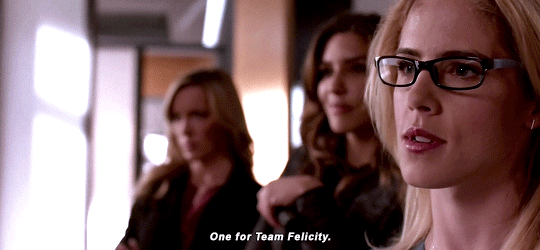
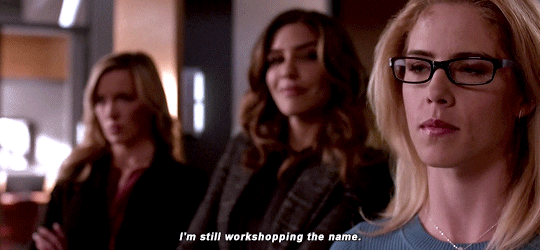
Source: felicitysmoakgifs
Team Felicity, yes that’s the name, has such a fantastic light bulb moment when they realize they can use this Slabside evidence to appeal Oliver’s conviction. I don’t know how. I’m not a lawyer. I don’t know how Oliver was convicted in the first place because he was acquitted. How is he legally in prison? Whatever. I don’t care. Just get him out and send him home to his woman. That’s all I want. I’ve enjoyed the prison arc more than I anticipated, but I’m ready to be done.
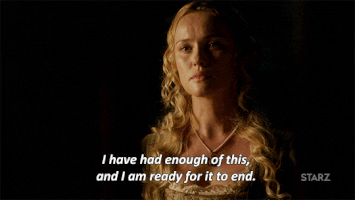
Curtis and Diggle
Lord people. I cannot with Curtis. His undercover mission takes up a significant chunk of the episode and this is how much I care:
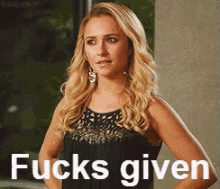
Fourteen PhDs???? FOURTEEN!!!!!!!??????

I am trying to hang with you show, and I realize you are a fantasy drama, but this is not humanely possible. Also, I am taking issue with Diggle reading out Curtis’ credentials when just last week Felicity tipped her hat to her credentials. She mentions going to MIT and then next week we are listing Curtis’ ridiculous number of PhDs and six languages?!
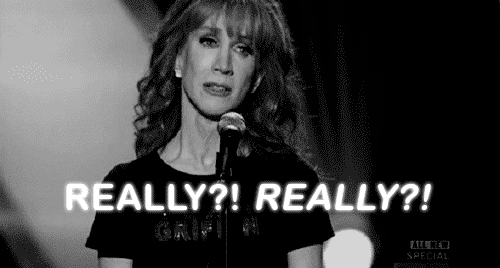
It feels like a bizarre pissing contest and yet these writers want me to believe this character is not in competition with Felicity.
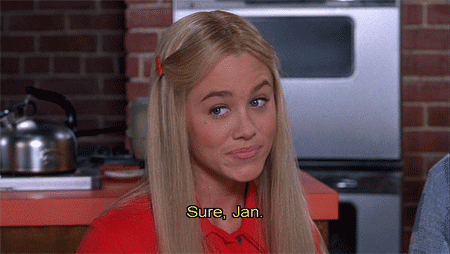
Cammien Ray tweeted something brilliant yesterday and I thought it really summed up one of my primarily beefs with Curtis and Diggle having this storyline. This is everything we asked for Felicity, but they gave it to Curtis.

Felicity is off doing her own hero-ing and therefore the writing team’s ass is saved, but this character is in constant competition with Felicity. More often than not, Curtis over shadows Felicity so he has a friggin purpose on this show. Arrow is an extremely male dominated series. We don’t need one of few strong female characters sidelined for another male character’s benefit.

Curtis bemoans all of the misery being a vigilante has brought into his life. Yes, Curtis has suffered the most out of all the characters.
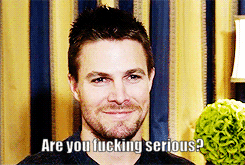
Oliver lost his freedom, Felicity lost her husband and child and Dinah’s boyfriend is dead. Hell, even Rene has more to bitch about. Zoe’s life was in danger for most of Season 6. BL*CK S*REN has more to be upset about. Her boyfriend, father and pseudo father figure are all dead.
But Curtis? He got a divorce. Sure, that’s sad, but his ex husband isn’t dead. Curtis is probably paying him alimony.
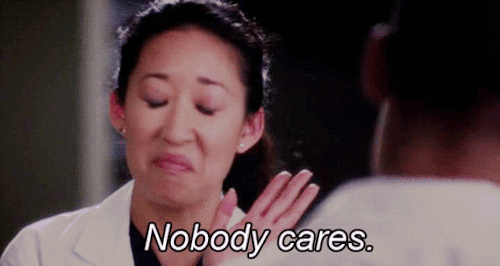
Curtis was stabbed, his boyfriend shot, THEY BOTH SURVIVED, but woe is me.

Diggle has the audacity to compare Curtis to soldiers who have fought in war.
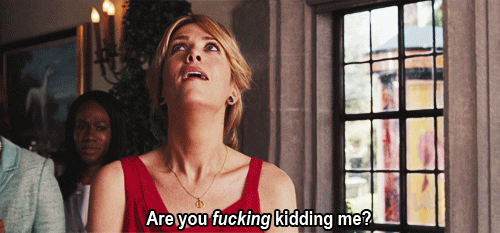
We are not comparing Curtis and his T balls to men serving in the military. The reason why Curtis doesn’t look “done” when compared to those soldiers, John is because HE HAS NOT FOUGHT IN A FUCKING WAR OR SUFFERED ANYWHERE NEAR THE AMOUNT THOSE HEROES HAVE.
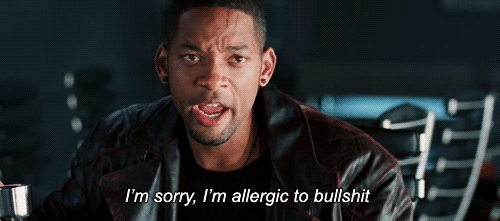
Both of you please shut up.
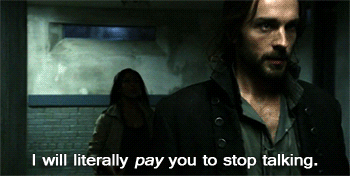
I couldn’t understand why Diggle was arguing for Curtis to remain Mr. Terrific when he’s given up on Spartan and Green Arrow. This is the second character IN A ROW Diggle has argued to break the rules and continue life as a vigilante. Whereas when it comes to Felicity she can’t be Overwatch or break any laws to free her husband.

I also don’t understand why Diggle is arguing Curtis is so vital to the team when the truth is there are other characters that can do what he does and BETTER. Rene and Dinah are better fighters than him. This is the first week he looked mildly proficient in the field. This is why I say he’s the new LL. One week he can’t take down one bad guy, but the next he’s fighting twenty different people. It’s inconsistent and illogical.
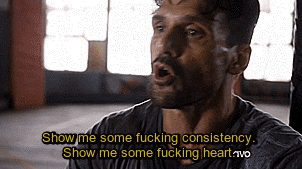
Felicity is a genius and all the tech goddess we need.

Anytime they use Curtis’ brilliant mind it’s to short change her. NO THANKS. The only thing Curtis brings to the table is his T spheres and pretty much everyone can operate them. I am quite annoyed with Diggle for trying to talk Curtis out of sidelining himself.

Arrow continues to glaze over Curtis’ role in Oliver ending up in prison, there’s been no apology and he refuses to help Felicity. Instead, they write an episode where Curtis is given all the storylines we’ve asked for Felicity. Then Curtis whines about how tough life is when the other characters he refuses to help are suffering more. This is not the way to win me over. USE THIS CHARACTER LESS. He needs to disappear from my TV screen for a long time or, God willing, permanently. The more this show shoves this character down my throat the more I dislike him and I have a sensitive gag reflex.
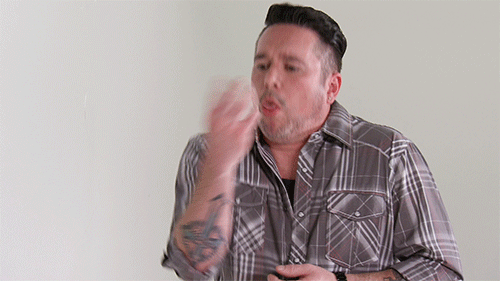
Stray Thoughts
“Empathy’s a word I’m learning. It’s a work in progress” HA! Loved this line.
I know neither Dinah nor BS are Felicity’s besties, but it was nice having all the women work together in an episode. It also gave Felicity a chance to unload some of her grief and fears. Can we make this a regular thing? Felicity needs girlfriends.
“I taught you to separate the man from the monster. Instead, you exposed your true identity for all the world to see and became the monster you always feared you were.” Bitch where?
Talia teaching Oliver to separate his two selves ultimately lead to her father’s death, so there are consequences for her choices too.
Felicity changes out of her high heels and skirt into jeans and tennis shoes for her visit with Oliver. The practicality in Felicity’s wardrobe this year is A+, so let’s keep the logic. Nobody drives to a prison in heels and she sure as hell shouldn’t wear them out in the field.
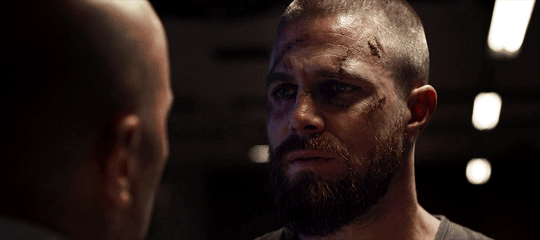
Oliver’s face when he finds out there’s no visitation in Level 2 looks like he was just told his puppy has cancer. Source: olivergifs

You have not met Felicity “I Will Always Always Always Wait For You” Smoak. Suck a hot one, guard. Source: olivergifs
Why are the A.R.G.U.S. uniforms so dorky? Let’s cool them up costume department.
I need Stan to be good. Can we just let Stan be good?
Stephen Amell is 6 ft so the inmate who died is ENORMOUS.
Don’t you love how there’s been zero Diaz in any of these past few episodes? He’s just like the Boogey Man, but we never have to see him. It’s fantastic.
I don’t buy for a second Diaz took out a bunch of Bratva, but my larger concern is don’t hurt my Anatoly.
No flashbacks. Interesting.
That Elseworld promo was jarring. I’m scarred for life.
Disclaimer: Any gifs on the blog are not mine. If you would like a gif removed from my reviews, please message me. 7x05 gifs credited.
If you’d like to support the blog, please buy me a cup of tea!
#arrow#arrow 7x05#oliver queen#felicity smoak#olicity#arrow season 7 reviews#anti black siren#anti john diggle#anti laurel lance#anti dinah drake#arrow season 7 episode reviews#season 7 episode review
115 notes
·
View notes
Link
This review may contain spoilers.
Ever since I first heard about this film I was hoping it would come to my local cinema. Frances McDormand is a wonderful actor and usually played fascinating characters. But then I heard that it was a McDonagh film and thought “Oh no, not that Calvary and The Guard dude”. Luckily it is the other McDonagh, Martin, who is the director & writer of Three billboards outside Ebbing, Missouri, I could look forward to it again.
I really enjoyed this film. It is dark and sad and tragic, centering on a mother trying to find out who raped and murdered her daughter when the police have no leads and no suspects. It is filled with anger and unsympathetic characters. But they are all humanised. We get glimpses of them as wider people than are portrayed on screen.
Sometimes I found that a little problematic, especially when it comes to the Jason Dixon character, is he really worthy of the audiences empathy? considering his actions?
But it is mainly McDormand’s film, and she carries it brilliantly. She is tough and hard-nosed and so full of anger. Yes about her daughter’s death, but also about her life in general. And just life. She wants justice, or revenge. I’m not sure she knows which. She certainly wants to find out who is responsible, and because that doesn’t seem to be forthcoming she blames the police, hence the three billboards of the title.
A lot of praise is also going Woody Harrelson’s way, and I can understand that, he is great in this role. But I am, once again, ambivalent about his characterisation and his actions. He is a decent man, trying to do his best. Okay, fine he sees the potential in some of his officers, and knows they can be better, but there is no hint that he is actually taking action against what they are doing or have done.
The whole backstory about the torture of a black prisoner… I mean, if Dixon did that then it doesn’t matter what his potential or personal tragic backstory was, he needed to be fired by Willoughby, not protected and excused. Also Dixon’s assault on Welby should have had greater repercussions. Why does a man that would do such things deserve to be rehabilitated to the viewers? without really ever making amends? It strikes me that we rarely get to see anybody apart from a white US man make such a catalgoue of errors and yet still redeem himself. But then again, I think part of the central message of the film is that hate destroys. Or at the very least all it creates is more hate and violence, as Penelope points out “hate begets hate”. At the same time, however, love and compassion are great, fantastic, but having love and compassion for people does not mean letting them get away with racist, violent shit just because they have potential.
So overall, I really really enjoyed this film. But I do have some issues with how it addresses some key characters and actions.
Logged on Letterboxd
0 notes